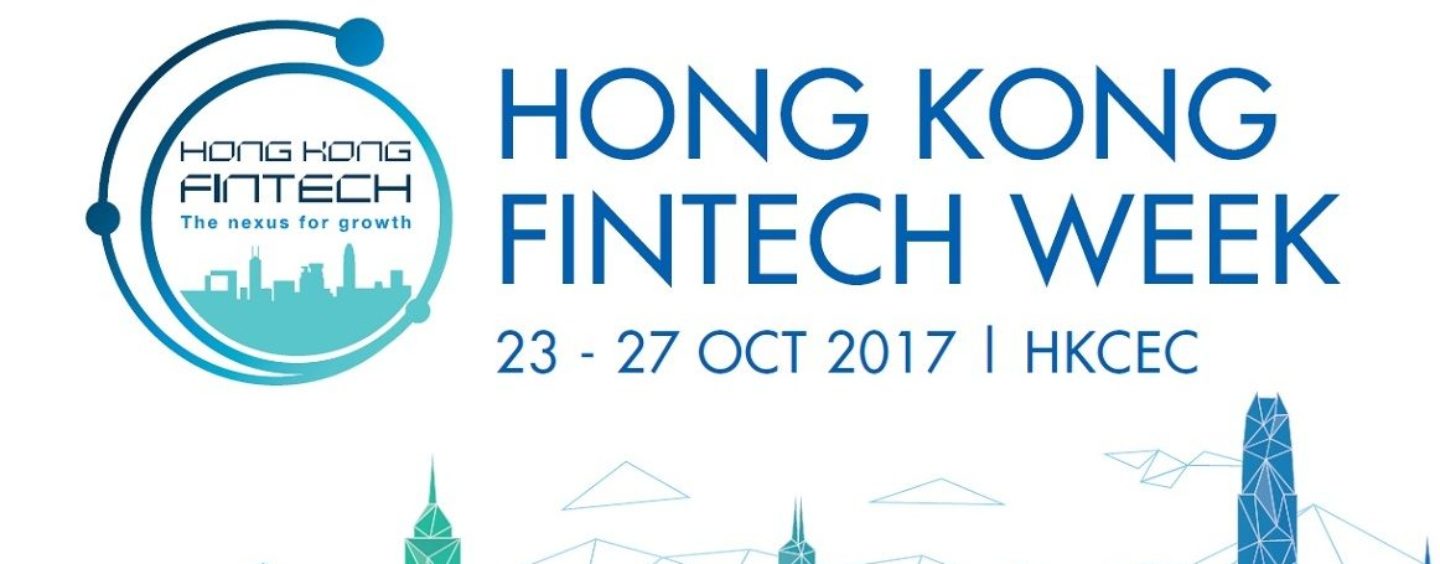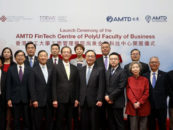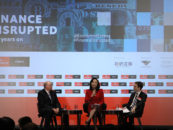The momentum from the opening day of Hong Kong Fintech Week, organised by Invest Hong Kong (InvestHK), continued into day 2 with a full main hall and very busy workshops alongside, as the focus of sessions moved to Insurtech and Wealthtech in the context of blockchain, the main theme of the first two days.

In his keynote, Executive Chairman, Aviva Asia & Friends Provident International and Global Chairman, Aviva Digital Chris Wei opened by saying that in the absence of innovation, insurance customers default to size – the biggest players. He said that to get ahead, Aviva needed to innovate and to do that it had to completely split its digital from its legacy business.
“Our legacy opps couldn’t do digital… they tried but got more of the same,”
said Mr. Wei, adding that there were understandable reasons for this, but it just did not work. It resulted in the decision to run the digital business separately all the way up to board level. Now, rather than planning products months in advance, there’s far greater near-term agility. Daily work is now centred around
“optimisation based on feedback from customers on products.”
Mr. Wei reminded the audience of the age-old saying,
“insurance is sold, not bought,”
before adding that it’s fundamentally wrong. He said that insurance is about understanding customer problems and then providing a solution, not the other way round.He noted later on that advisors are needed when customers are confused, so the confusion needs to be eliminated.
Key to being able to do this effectively is data, he said. Data can remove the need for unpopular and long-winded form filling, questionnaires, identity validation, claims processes and so forth, speeding up the entire process and improving customer experience. This is what it encourages people to change – like having sufficient confidence to move from credit card to e-wallet.
“Listen to customer complaints is the best way to improve customer experience,”
said Mr. Wei. He said that Aviva now has a Call of Duty game designer doing product design to improve the overall experience.
He cited Zhong An as a good example of an insurance company that has created many, many ways for customers to access its products, highlighting its willingness to try things out. Mr. Wei did caution, however, that Zhong An
“needs more insurance risk capability.”

On the subject of legacy systems during a panel session about “Dissecting Insurtech,” Annette King, Co-Founder of Galileo Platforms, reiterated Chris Wei’s point that legacy systems make agility difficult and very costly.
“There’s a need to remove friction for the customer,”
said Ms. King.
“Blockchain provides incredible agility, in terms of timeframe and cost, and time to get to market.”
She noted that insurance was created over a hundred years ago and hasn’t changed much during the intervening years. That’s now changing with improving productivity and creating new forms of distribution – digital and personal.Blockchain facilitates that by enabling access to all parties in real-time.

“Blockchain is a wondercure,”
said Rudi Spaan, President and CEO of AIG Hong Kong, as he emphasised its value as a way of creating trust.“Digital trust is essential.”
Solutions for problems, not the other way round, was a theme touched on by Mr. Spaan. To do this, he recommended innovation at a local level and to budget accordingly.
“The CEO needs to get out of the way,”
he said, reflecting a view that it’s best to stay hands-off and let the experts get on with their jobs.
Commenting on ways to innovate, especially for a large company with legacy systems, Mr. Spaan, said:
“Don’t buy; invest yes; don’t own.”
He emphasised that partnering is better than owning, particularly with small nimble companies and universities.
“Universities have great computers that do great modelling,”
he said, adding that they do it very quickly as well. Mr. Spaan was speaking on a panel discussing “The Future of Insurtech.” The others on the panel, from Aegon Asia and Sun Life Hong Kong, concurred on the merit of not buying.

The afternoon sessions focused more on wealthtech. Andy Hsu, Client Solutions Lead, Finance & Travel for Greater China at Facebook, gave a keynote in which he said that 2.5 billion people are not part of the formal financial system. It creates
“an opportunity for Facebook and the financial community to find a solution,”
he said. He emphasised the need for “efficiency, scalability and profitability in a mobile-first world,” the point being that and native solution should be mobile.

James Chang, Financial Services Consulting Leader, PwC China, spoke later about how the wealth management sector has been lagger on innovation, although
“most high net worth individuals are very enthusiastic about technology.”
CEOs recognise a need too, but there’s resistance from relationship managers. But it’s changing. He talked about algorithmic trading and robo-advisory, and the trend away from active to passive trading.
“This is one area where China hasn’t taken a significant lead on AI and robo-investment,”
he said.
“This is because China is less mature than other markets. China is still very retail driven, although it is moving to professional. The China market is also quite inefficient, so there’s room for active trading.”

Last month saw the establishment of the Hong Kong-UK Fintech Bridge. During a workshop in the afternoon, Stephen Philips, Director General of InvestHK, commented on the three main pillars of the agreement.
Mr. Philips said it’s a bridge at a government-to-government level; at a regulator-to-regulator level, to help Fintech companies to navigate in each other’s market; and at a business-to-business level – to increase trade and investment flows between the two markets, as well as to support Fintech companies to explore more opportunities.









